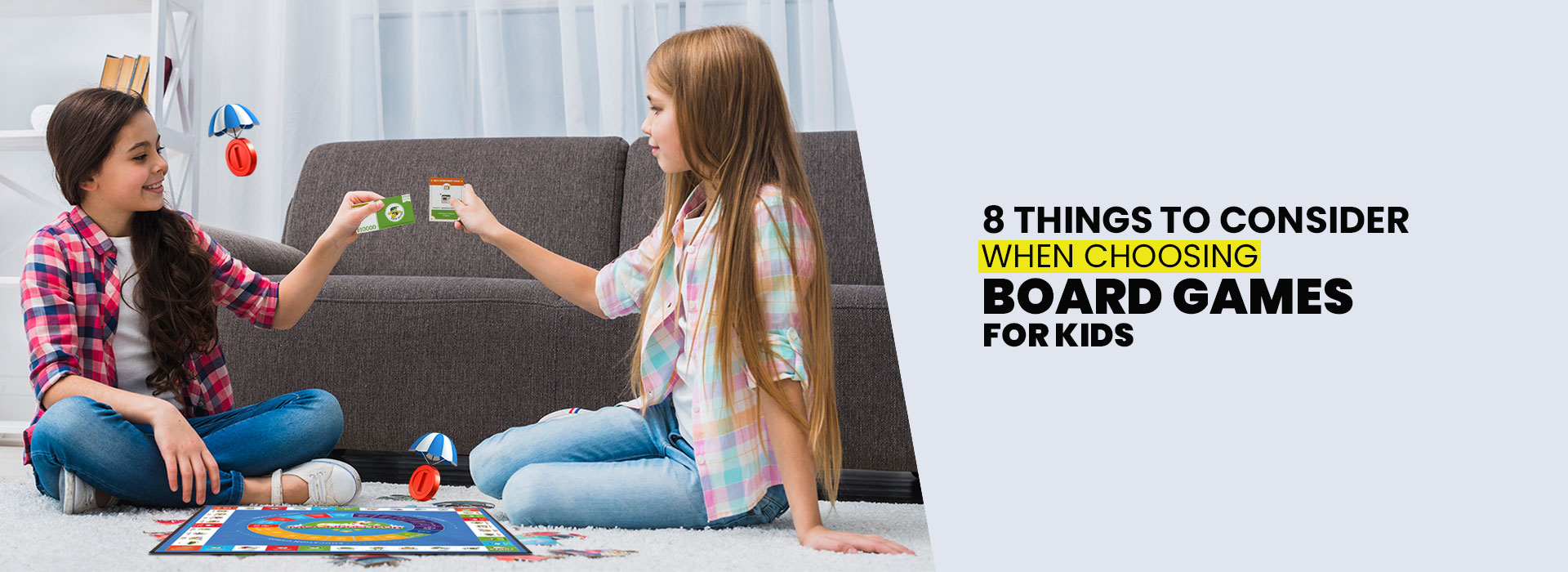

Prashant Pundir
8 Things to Consider When Choosing Board Games for Kids
Are you looking for ways to spend family time with equal interaction and lots of enjoyment? Board games could be your answer as they can be a fun and enticing way to sit together as a family and have some light-hearted moments, drifting away from all the hustle and bustle of life.
What is truly important is you choose the right kind of board game. No one wants to play a game that seems to become incredibly dull and dreary after a while. There has been an interesting development in the types of board games in the last few decades.
However, what usually happens is people get repetitive recommendations and they don’t really understand the true hidden gems that are available, or they just simply don’t understand how to choose the perfect board game to spend time with kids.
Children can get overwhelmed with the number of choices; therefore, it is important for us to recognize what is a good choice for them.
If you are struggling to find a good board game, do not worry. There are a lot of ways to come across your ideal game. You can ask your friends, visit a board game cafe, do a web search or follow board game vloggers and bloggers.
But even after all of this, how do you ascertain which board is correct for your child? There are a few points that you need to keep in mind before buying a board game, but what you most importantly need to avoid is not overthink it.
Here is a list of things to consider when choosing a board game for children –
- Older children find it hard to come back to it and play.
- If the game is too simple, keep it for a quick play game or simply pass it on to someone with younger children.
- If you dislike it at first go, read the instructions or watch a video and have another shot. Maybe you will understand the game better and how it works.
One of the latest suggestions and recommendations for a board game is Moonpreneur’s Moonpreneur. An entrepreneurial board game, Moonpreneur creates a blend of something highly educational and just as equally amusing. It is the ultimate business strategy board game.
Moonpreneur is an engaging board game that aims to foster entrepreneurial skills through active gameplay. It is one of the coolest and intriguing business games. The board game provides a holistic, almost real-life entrepreneurial experience and also tests the shrewdness of young minds. Moonpreneur is a step ahead of all other business games and brings to you a genuine sense of excitement and fun play.
Earlier, we were talking about the importance of entrepreneurship. Moonpreneur focuses on teaching entrepreneurship to children. It is a highly interactive, thought-provoking and fun-learning entrepreneurship game. Moonpreneur aims to enlighten you regarding the entire process of entrepreneurship and give you a complete practical experience of becoming an entrepreneur.
Now, what better way to learn entrepreneurial skills while playing a game? Sounds intriguing, isn’t it?
That being said let’s get back to how you select the best board game for your child. Below are a few things to consider when choosing board games for children.
1. Number of People Playing
There are so many games out there that can be played with just a single player to multiple players. Some board games are fixed in the number of participants while some are flexible. Always check the box before buying a board game and make sure it is in accordance with your preference. The box will usually tell you the players for example:
- 2 players: 2 players only
- 2-5 players: a minimum of 2 players to a maximum of 5 players
- 2+: at least 2 players with no maximum (these are often team games)
2. Attention Span
Is the game intriguing enough to keep the children hooked towards completion? The duration of the games varies from minutes to days. If you have young children, you might want to pick games with a short attention span and provide quick results.
You don’t want your little ones to think that the game is too long and dragging them to their limits. On the other hand, older children may love games with longer duration.
3. Focus
Focus is a very important aspect of a game as it truly signifies the ability of it to keep everyone involved. Is the game good enough for children to not wander off when it is not their turn and they’re not actively involved?
No one wants to feel bored and dreary while it is someone else’s turn and you can’t just keep bringing people back to the table. If this is the case, you should consider games with spontaneous action, where all players are involved at all times.
4. Theme
If your child has an inclination towards a particular topic, then go for the game that follows that theme. Board games have various themes and it is best to find out the theme your child is interested in so that they can have fun.
5. Game Play
Take a note of the kind of games your children have already played and did not like. This may give you an idea of their likes and dislikes. The gameplay is a very important element in selecting the right board game for your child.
6. Competition
Does your child have a competitive spirit? Then look out for games that allow them to pit against other participants and compete. It is not bad to be a winner. If this is not the case, then there are a number of co-operative games on offer as well.
7. Complexity
The complexity varies from game to game and it is important to recognize the right amount for your child. There are longer rule books and a lot to remember for more complex games. These games require deep thinking, planning and taking turns. Find out whether your child prefers games that have spontaneous action or slow movement before buying one.
8. Space to Play
How much space do you have, or how much space are you willing to provide to the game? Can you leave the game as it is and come back to it later if you don’t finish it in one sitting? If you have limited space, then it gets a bit squishy to have games with a big game board and cards scattered around. So, choose a game that fits well in the provided space.
Ultimately, the last and most important thing to mention is don’t confine yourself to “children’s games”. Expand your’s and your child’s gaming experience.
How do you select board games for kids? If you have any suggestions or tips, do let us know in the comments.










